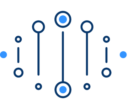The integration of artificial intelligence (AI) and machine learning is revolutionizing the drug discovery process. Rather than starting with a predetermined target and mechanism, a growing number of companies are using data-driven approaches to identify new drug targets by analyzing clinical and molecular data from human patients. These “human-first” techniques are focused on finding new targets for drug development, rather than validated targets and mechanisms identified in preclinical studies. This approach is being supported by increased investment, with companies such as Celsius Therapeutics, Verge Genomics, and Immunai receiving significant funding.
These companies are using AI to analyze a variety of data, including patient tissue samples, single cells, and vast collections of patient immunological data. Some, such as Verge Genomics and Relation Therapeutics, are also combining single-cell analysis with clinical insights to uncover new targets for treating diseases. In addition to these start-ups, big pharmaceutical companies are also adopting this approach.
Pharmaceutical giant Amgen acquired the startup company based in Iceland ‘deCODE Genetics’ in 2012 to gain access to its data resources, including genomic and clinical data from nearly half a million people. Other big players such as AstraZeneca and rapidly expanding Regeneron, have also built large collections of molecular and clinical data for drug discovery.
The incorporation of AI and machine learning in drug discovery has the potential to augment traditional hypothesis-driven approaches and identify novel targets that may have been overlooked using traditional methods. While it is still early days for this field, the progress of companies using these techniques will be closely monitored as they enter clinical trials. If successful, it could lead to the development of more targeted and effective drugs for a range of diseases.
This innovative approach to drug discovery is attracting significant attention and investment, as it has the potential to greatly impact the pharmaceutical industry. By using data-driven techniques to identify new targets and mechanisms, rather than relying on preclinical studies, companies can potentially increase the chances of success in clinical trials.
The use of AI and machine learning also allows for the analysis of large amounts of data, potentially leading to the identification of targets and mechanisms that may have been missed using traditional methods. The potential of these techniques is vast, and it will be interesting to see the progress and success of companies using them as they move into clinical trials.



